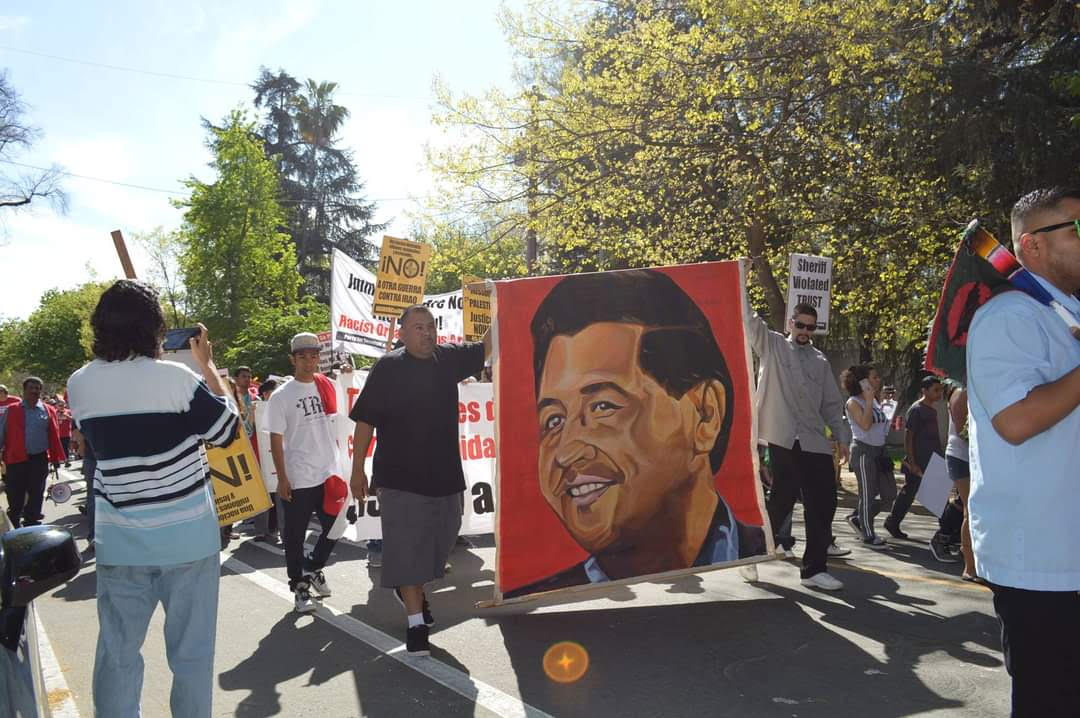César E. Chávez State Holiday Celebration in Northern California. CBM photo by Antonio Ray Harvey.
Antonio Ray Harvey | California Black Media
United States Sen. Alex Padilla (D-CA) and Congressman Raul Ruiz (D-CA-25) last week introduced bicameral legislation to create the “César E. Chávez and the Farmworker Movement National Historical Park.”
The bill calls for preserving nationally significant sites associated with labor and civil rights leader César E. Chávez and the farmworker movement in California and Arizona. The legislation is co-sponsored by Sen. Dianne Feinstein (D-CA) and U.S. Congressmembers Raul Grijalva (D-AZ-7) and Rueben Gallego (D-AZ-3).
“On César Chávez Day we commemorate the work and legacy of an iconic Latino civil rights leader,” Sen. Alex Padilla said in a statement. “Establishing the César E. Chávez and the Farmworker Movement National Historical Park will pay proper homage to Chávez’s tireless work for the dignity, respect, and equal treatment of farmworkers.
Last week, Gov. Gavin Newsom declared March 31, 2023, Cesar Chavez day in California.
Padilla continued, “Our National Park System tells the story of our nation and preserves the people and movements that we value as Americans. Yet our park system does not yet adequately preserve the full culture and diverse legacy of all Americans. This legislation would bring us closer to the recognition farmworkers have earned and deserve.”
Chávez is a Latino icon and civil rights leader, labor leader, and community organizer whose legacy is intricately connected to the story of California, the farmworker labor movement, and the push for worker and civil rights.
Chávez empowered Latinos and farmworkers to fight for fair wages, health care coverage, pension benefits, housing improvements, and countless other protections for their well-being. His commitment to social justice has inspired many, and advocates and activists point to him as a role model for their ongoing efforts to improve the lives of all people, regardless of their ethnicity or the color of their skin.
As a farmworker, César Chávez maintained a strong connection to the environment; and the bill by the lawmakers intends to uplift Chavez’s story, and those of others whose contributions helped build the farmworker and civil rights movements that are pillars of American history.
“Growing up the son of farmworkers in the Coachella Valley, I remember seeing César Chávez and the sense of hope he gave to our communities and farmworkers across the United States. His story still inspires and motivates me even today,” said Ruiz. “My legislation with Sen. Padilla, the César E. Chávez and the Farmworker Movement National Historical Park Act, will help the National Park Service (NPS) embrace their role as storytellers of our nation and reflect the diversity and richness of our people.”
There are hundreds of sites that are part of the National Park system that preserve natural, historical, and cultural heritage while offering vital spaces for teaching, learning, and outdoor recreation.
The bill establishes the César E. Chávez and the Farmworker Movement National Historical Park, which incorporates the headquarters of the United Farm Workers (UFW) at La Nuestra Señora Reina de la Paz in Keene, California, and expands upon the existing César E. Chávez National Monument.
The bill includes a provision to “Conduct a National Historic Trail Study” for the “Farmworker Peregrinación National Historic Trail,” the 300-mile march route taken by farmworkers between Delano and Sacramento in 1966.
If the legislation passes, the Department of Interior will be required to complete a general management plan for the historical park within three years.
In 2012, President Barack Obama’s established the César E. Chávez National Monument in Keene, which recognizes the achievements and contributions to the history of our nation by Chávez and the farmworker movement.
Obama traveled to Keene to announce the establishment of the monument. From the early 1970’s until his death in 1993, the site functioned as the residence and workplace of Chávez and his family, and now is home to Chavez’s grave.
“César Chávez gave a voice to poor and disenfranchised workers everywhere,” Obama stated in October 2012. “La Paz was at the center of some of the most significant civil rights moments in our nation’s history, and by designating it a national monument, Chávez’ legacy will be preserved and shared to inspire generations to come.”







